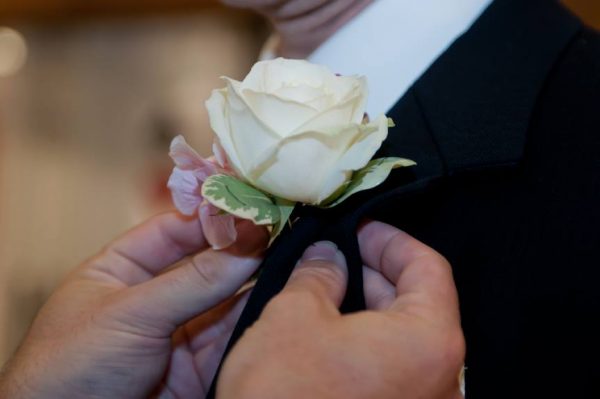
by Michael | Apr 10, 2017 | Blog
Last time, Mish from KP Events in our guest post, gave us some welcome advice about controlling wedding costs – especially food, drink, DJs and photographers. Here are other areas where you can save without compromising quality.
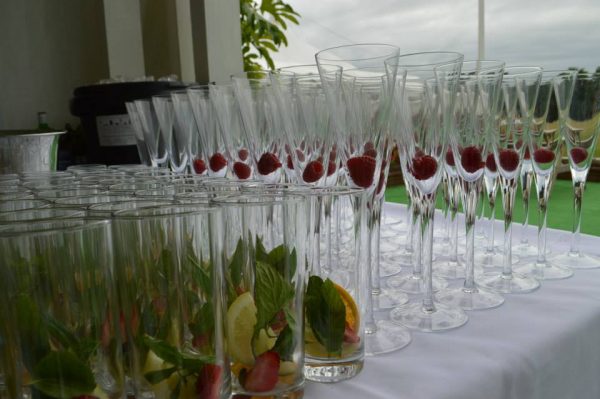 Drinks
Drinks
Alcohol need not be such a big factor at a wedding – often one half of every couple will be driving anyway. Despite that, it’s easy to get carried away and run up a heavy drinks bill if you’re not careful.
The most obvious saving comes from serving sparkling instead of Champagne. There are plenty of terrific Proseccos and Cavas out there that tend to go down a treat and it’s always fun researching which one to go for before the big day.
Keeping spirits out of the equation is another sensible option. People generally won’t miss them, and if you happen to know that your uncle Alfred has a penchant for Scotch, and you don’t want him going home disappointed, you can always leave a sneaky bottle behind the bar.
You could consider paying for reception and dinner drinks and then having a pay bar after dinner – you may not like the idea but it is a customary and understandable option.
Lastly, during the meal, bottles on the table work well in that people generally only pour what they can drink, whereas if you have staff pouring, we find that people accept the top-up offer even if they’re not likely to continue drinking. As a result a lot does go to waste at the end of the evening.
Invitations
As nice as fancy invites may be, environmental concerns have made it perfectly acceptable to invite by email. You can still design something that’s creative and personalise each invite, but then simply email it rather than post it. Let’s face it – the invite’s not going to make or break the day.

Flowers
You can spend a fortune on flowers. If using a florist, make sure you find out which flowers are in season as they will be considerably cheaper than those that are imported.
You can of course do the flowers yourself or give the task to a creative friend who will feel flattered to have been given the responsibility.
Old jam jars make great vases and stores like IKEA have all sorts of interesting bottle shaped containers, so if you’re prepared to do the table centre arrangements, you’ll be dramatically cutting your floral costs. You can even find prepared arrangements off the shelf at places like M&S.
As a half-way option you might consider using a florist to do the button holes and bouquets but doing the table centres yourself as those are relatively easy.
Depending on the logistics of your day, you may even be able to re-use the flowers from your ceremony on the top table.
Remember – as beautiful as flowers can be, they’re ancillary rather than integral to the event.
Cake
Like flowers, wedding cakes can also eat their way into a surprisingly large chunk of your budget. And more often than not, with a cheese course and dessert already dealt with, no-one has any room for cake. It therefore becomes an extremely expensive photo-prop for the cutting ceremony.
If you’re going to have a cheese board anyway, then why not have a tiered cheese board in the shape of a cake and kill two birds with one stone. Equally you could lose the cheese altogether and have the cake as the principal dessert – maybe with some fruit on the side.
Another attractive and really popular option at the moment is to replace the cake with personalised cup-cakes on a large tiered stand.
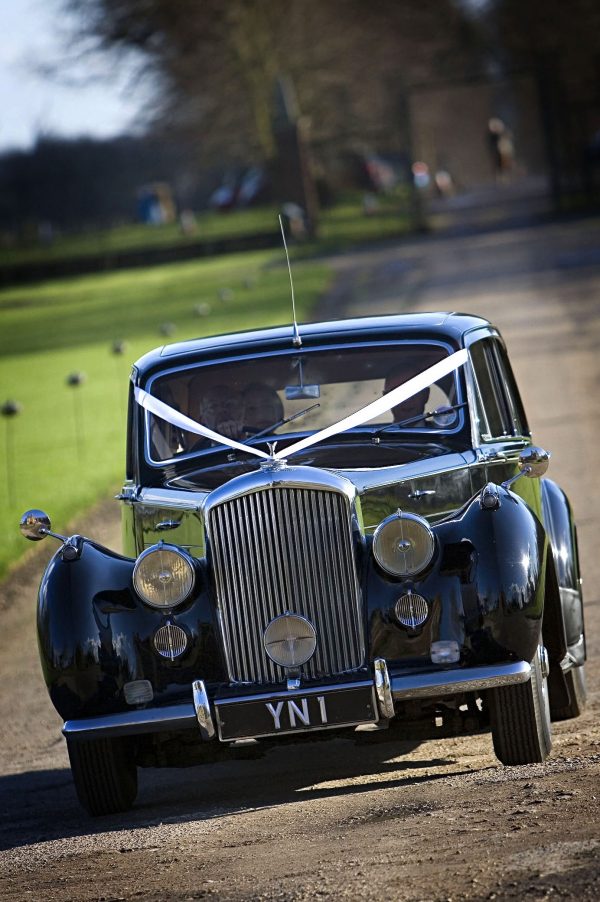
Cars
Multiple cars for the whole bridal party is, in our opinion, an unnecessary expense. If it has always been part of the princess dream, fair enough, get one for the bride and get friends with nice or interesting cars to do the rest – again they’ll be flattered to have been asked. And if you really do have guests who are going to be blown away by seeing a ’54 Bentley R-Type, then buy them a ticket to the Goodwood Festival of Speed – it’ll be much cheaper.
Décor
Lighting is by far the most effective way of ‘decorating’ a room. It can change a seemingly ordinary space into something spectacular and is versatile enough to create different moods as the event moves through its transitions from reception to meal to dancing to wind-down. Pound for pound, money spent on lighting is usually very good value.
If you are theming your party, customised props are generally expensive. There’s a lot however that you can do with table numbers, seating plans and place cards – all for £50 and a bit of creativity.
Equally, candles, lanterns, fairy lights and bunting are relatively cheap accessories that (if used appropriately) can really add that extra something.
You don’t have to have a colour scheme ‘per se’ but do ensure you have an element of colour consistency across the venue – something that can be achieved simply through lighting, linen, flowers, bunting, etc. Even food and drink can be tied into a colour scheme but now we’re adding to costs rather than reducing them!
Not forgotten …
There are two aspects we’ve not touched on in this article – civil celebrants and venue choice.
In regard to civil celebrants, the fact that you’re reading this on Michael’s blog would suggest that you’ve already found your way to the very best and clearly need no more guidance on the subject!
In regard to venue choice, many couples are often quite clear about where they want to hold their wedding and only need help with all the rest.
That said, matching up our clients with their dream venue is something that we love doing at KP Events and we have extensive knowledge of all kinds of potential locations – many of which are off the beaten track while each offering something quite unique. And a lot of them don’t cost quite as much as one might think …
To find out more – or indeed for help with any aspect of your big day – please do give us a call.
Conatct Mish or Kati on 020 8883 7411
www.kpevents.co.uk | www.facebook.com/kpeventslondon
by Michael | Jan 6, 2016 | Blog
Once the engagement is announced, sharks start circling round the couple, becoming frenzied at the scent of money. Is the wedding planner likely to be one of these?
Wedding planners may well charge thousands of pounds for what appears to be about 4 hours’ work, so do they give value?
Money for old rope?
But, if we dig a bit deeper, they may actually not be ripping you off at all.
In reality, the wedding planner spends many hours before the wedding day, planning, communicating, organising rehearsals, meeting suppliers, travelling and dealing with paperwork.
Similarly, photographers, florists, DJs, Civil Celebrants and other professionals appear on the day, but don’t assume that that is the only time that they are working on the wedding!
Far from it.
Choosing your Wedding Planner
Ideally, you will know someone who has worked with the wedding planner and can recommend her. Failing that, their website will help, but an exploratory phone call – have a list of questions ready – will give you an idea whether you would even want to work with this particular person.
This is an event where you really don’t want things getting forgotten or going wrong. So employing someone you have doubts about – or an amateur – could be a huge risk.
Cost
You can expect professionals to have experience, training and passion – and those qualities rightly don’t come cheap. Skill and specialisation are keys in this business, and you have to pay for these.
Wedding professionals are not like many solicitors, invoicing you per e-mail and itemising each expense. You pay the full fee and this may encompass many planning meetings, calls and consultations, not to mention countless e-mails with the client over the course of what may be a year or more.
Benefits
Each wedding planner values her reputation. She can’t afford to mess up, so the professional goes the extra mile to ensure things don’t go wrong. Actually, something probably will go wrong at some point in the day – that’s the way it is. But the wedding planner can reduce and minimise any negative impact.
The professional wedding planner will offer advice – not for her own convenience, but for your benefit. Her experience and knowledge can be invaluable.
You may actually save money by employing a wedding planner. If you are taking on hiring a venue or marquee, arranging the food, drink and catering, crockery, silverware, rentals, flowers, centerpieces and the rest, all by yourself, not only will that set you back more than you might expect, but you won’t have peace of mind (especially if you are a perfectionist).
So weigh up the pros and cons, inform yourself, and do what makes most sense to you.
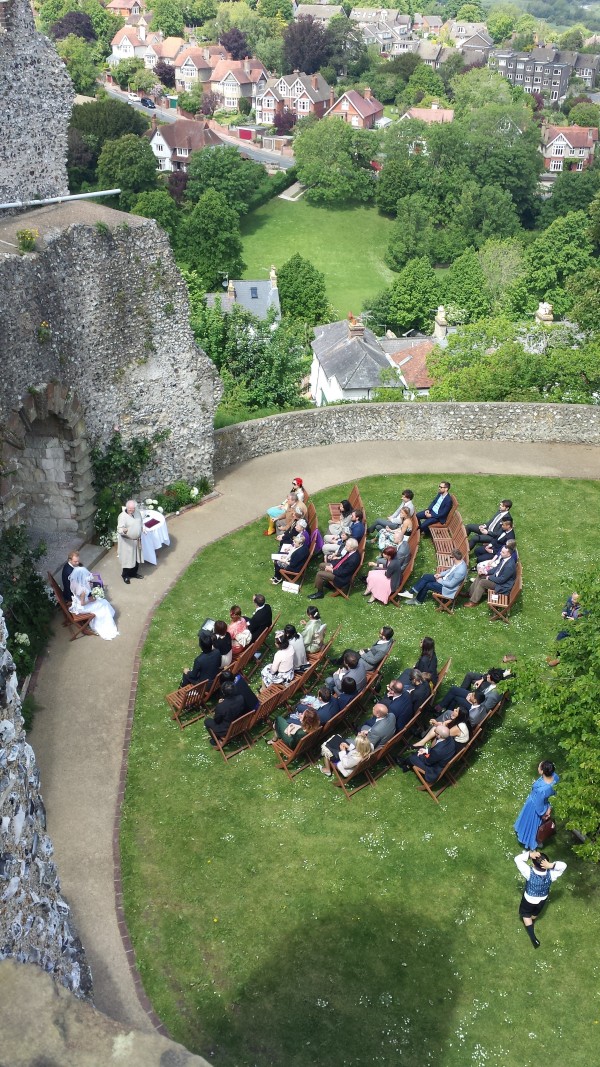
by Michael | Jul 14, 2015 | Blog
In my experience, most couples – especially the men! – don’t really know what can go into their wedding service. There are exceptions, of course, but most people have enough trouble accepting that there are alternatives to either a full religious church service or the somewhat sterile register office ceremony.
Creative ceremonies are very much a possibility, and all you actually need to ensure is that the legal formalities are catered for.
What do I mean by “creative”? Well, how long is a piece of string?
To begin with, do you plan to hold the ceremony indoors or out? How conventional do you want it? Do you want it under the sea? In a plane? Up a mountain? In a back garden? They’re all possible.
To speak fairly generally, you can hold a fairly traditional ceremony that, to all intents and purposes, looks like the wedding my grandparents would have expected (except that it might not be held in a religious edifice).
You may opt for a pagan ceremony. A handfasting will invoke nature blessings and can be most exciting.
Then there are various gradations of religiosity. You could have a few prayers and blessings, some originating from other liturgies or cultures, and of course it might be a humanist-type wedding, with no religious words at all.
A Civil Celebrant-led wedding can cover any degree of religiousness, but your choices don’t end there. There’s the language to be used (by that I mean formal or informal), there’s the music to be decided, what readings or poems will be used, and, indeed, whether you want friends or family participating.
Perhaps the element that differentiates weddings the most is the choice of ritual. I’d like to speak about this more next week, but just a few pointers as to what I am driving at.
Depending on personal beliefs and preferences, you can include rituals from your own or other religions. An East European ritual, for example, involves the couple being presented (usually by a mother) with a loaf of bread. They both bite into it simultaneously, and the person who gets more will supposedly be the head of the household!
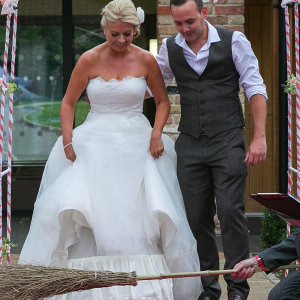
One of my favourite rituals normally comes at the end of the ceremony, is pagan, and can bring a smile to everyone’s face. It’s called “jumping the broom”, and the couple have to jump together over a besom. This symbolises sweeping out the old and bringing in the new, as they start their life together.
Some more suggestions will follow next week, but if you can’t wait till then, feel free to contact me!
by Michael | Jan 27, 2015 | Blog
Weddings can be honey-traps. Look at wedding planners, for example.
These people may well charge thousands of pounds for what appears to be about 4 hours’ work.
Money for old rope?
But, if we dig a bit deeper, we may actually not be talking rip-offs at all.
In reality, the wedding planner spends many hours before the wedding day, planning, communicating, organising rehearsals, meeting suppliers, travelling and dealing with paperwork.
Similarly, photographers, florists, DJs, Civil Celebrants and other professionals appear on the day, but don’t assume that that is the only time that they are working on the wedding!
Far from it.
Choosing your Wedding Planner
Ideally, you will know someone who has worked with the wedding planner and can recommend her. Failing that, the website will help, but an exploratory phone call – have a list of questions ready – will give you an idea whether you even want to work with this particular person.
This is an event where you really don’t want things getting forgotten or going wrong. So employing an amateur could be a huge risk.
Cost
You can expect professionals to have experience, training and passion – and those qualities rightly don’t come cheap. Skill and specialisation are keys in this business, and you have to pay for these.
Wedding professionals are not like many solicitors, invoicing you per e-mail and itemising each expense. You pay the full fee and this may encompass many planning meetings, calls and consultations, not to mention countless e-mails with the client over the course of what may be a year or more.
Benefits
Each wedding planner values her reputation. She can’t afford to mess up, so the professional goes the extra mile to ensure things don’t go wrong. Actually, something probably will go wrong at some point in the day – that’s the way it is. But the wedding planner can reduce and minimise any negative impact.
The professional wedding planner will offer advice – not for her own convenience, but for your benefit. Her experience and knowledge can be invaluable.
You may actually save money by employing a wedding planner. If you are taking on hiring a venue or marquee, arranging the food, drink and catering, crockery, silverware, rentals, flowers, centerpieces and the rest, all by yourself, not only will that set you back more than you might expect, but you won’t have peace of mind (especially if you are a perfectionist).
So weigh up the pros and cons, inform yourself, and do what makes most sense to you.

 Drinks
Drinks



